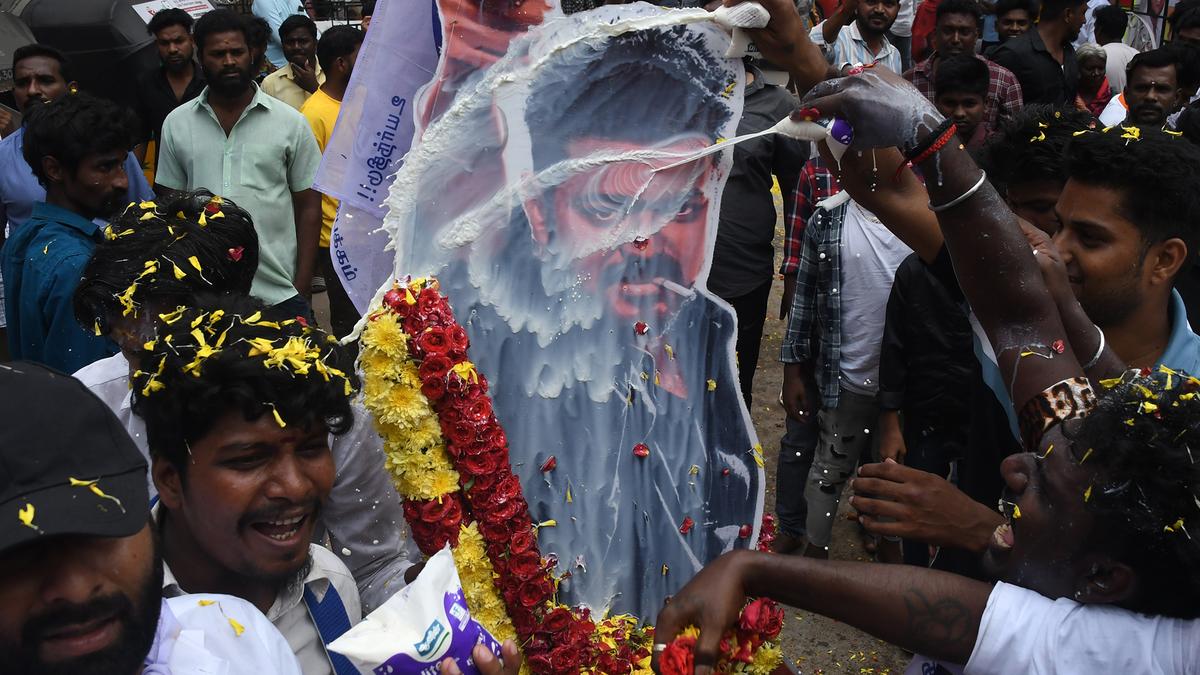A file photo of actor Vijay’s fans outside Sri Brinda Cinema Hall, Perambur, on the release day of the actor’s film ‘Leo’ on October 19, 2023. | Photo Credit: Jothi Ramalingam B
There has been an atmosphere of uncertainty in Tamil cinema since the lockdown due to the Covid-19 pandemic. On Monday, the Tamil Film Producers Council (TFPC) released a statement on the rules to be implemented for the production and release of films in Tamil Nadu.
The announcement mandated an eight-week streaming release window for films featuring big stars; barred actors from taking on new projects before completing their prior commitments; called for a temporary halt on the production of new films from August 16 to resolve the situation where several films were stuck; and called for a halt to all film-related activities from November 1 this year to implement measures to regularize actors’ remuneration.

The statement also alleges that Dhanush has received advance payments from several producers, and that producers should consult the council before starting their films with the actor. The governing body’s six-point statement and the mention of Dhanush have created a stir far and wide.
On Tuesday, several members of the South Indian Artistes’ Association, including actor and treasurer Karthi and actor and vice-president Poochi S, Murugan, condemned the council for not involving them in discussions before releasing the statement. “We have been taking measures to address the issues that the producers’ council had pointed out earlier, and therefore, it is shocking that they have released this without consulting us with the concerns,” Karthi said.
Also read:Are OTT platforms a gamechanger for the Tamil film industry?
Meanwhile, stakeholders have raised concerns over how the regulations will be enforced. Actor Shanthanu Bhagyaraj believes a strike of this scale will have a huge impact on thousands of members of the film workers union across south India and their families. “High-end technicians and top actors can manage if their shoots are postponed, but what about daily wage labourers? Or, character artistes who do multiple projects simultaneously unlike big stars?”

However, actor-producer J. Sathish Kumar believes that such drastic measures are needed when the situation is so dire. “There is no guarantee for the producer on the money invested. On one hand, many films depend only on theatrical revenues; satellite and digital rights are not getting good deals even for films of A-listers and B-listers. On the other hand, actors’ remuneration has gone up a lot and there is no limit on the production cost of a film,” says Sathish, explaining how the shorter streaming-release window is affecting the business from theatres.
According to Sathish, the move to put a halt on new projects till August 16 is a message to not ruin the industry by flooding it with films. “More than 250 films are yet to release. So what is the point of starting new films when so many films are still struggling to release?”
Also read:How will cess on movie tickets, OTT subscriptions help distressed workers and artistes in Karnataka?
Shantanu expresses concern about how small producers will deal with the request to complete their film shoots by October 30. “Producers have to go through a lot of trouble to invest in their productions and raise money. With such deadlines, what will small producers – who usually raise funds in small denominations to meet their immediate expenses – do to raise funds?” asks Shantanu.
Both Shantanu and Satish believe that there is a need for regulation on how streaming platforms are dictating the film business. Satish says that OTT buying select films is unfair. Shantanu says this has led to a situation where supply is more than demand and the flow of business was smooth before OTT. “To have enough content in their bank, these corporations bought all the films at a profitable rate, which gave producers hope that they would not have to depend only on theatres. But while producers were grateful for that hope, streaming platforms started refusing to buy their films,” says Shantanu.
Pointing to the rising cost of entertainment in theatres due to the OTT-based business model and multiplexes taking over single screens, the actor hopes the Producers Council will focus more on promoting the theatre business of films.
Also read:The many forms of violence on screen
It is uncertain what will happen with the proposed ban on film shoots after November 1, but Ruban Mathivanan, owner of Chennai’s GK Cinemas, assures that it will not affect theatres or audiences in any way, at least not till the end of the year. “There are many films lined up for release by next year, and hopefully, all stakeholders will find a solution by then.” Welcoming the eight-week streaming-release window for films with big stars, Ruban says such a move was always necessary to allow smaller films to find some success in theatres.
Satish says, “Talks are on at the moment, so there is a possibility that the issues will be resolved before the strike. It is not in our hands; it all depends on how all the stakeholders arrive at a mutually agreed solution.”
